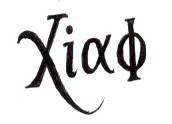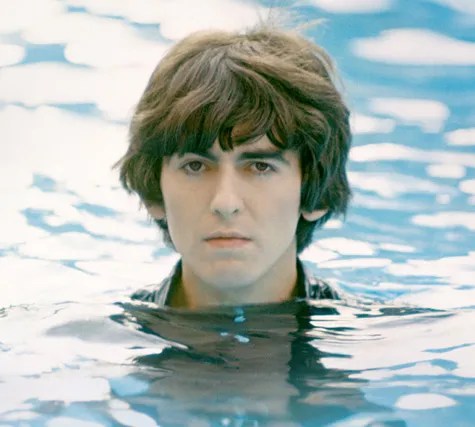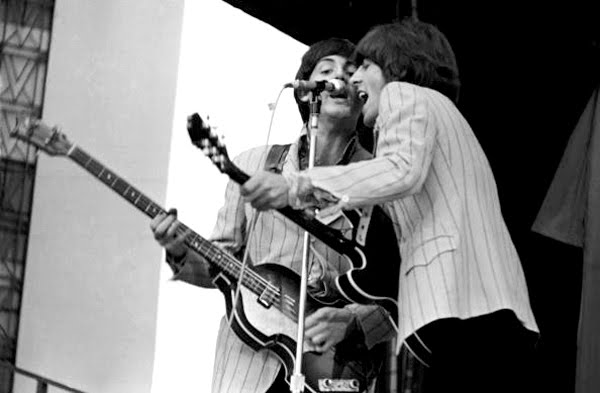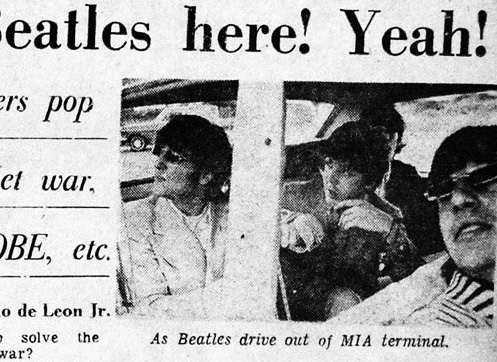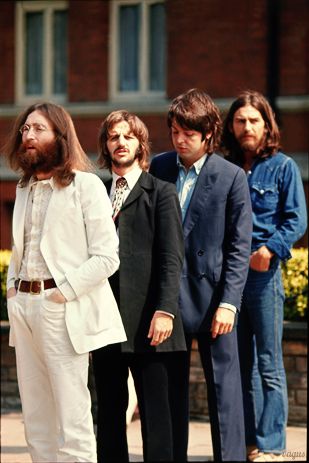GEORGE HARRISON (1943-2001): THE SILENCE IS HEARD (An imagined interview based on research)
(Written for Prof. Patricia Mae B. Jurilla’s Communication II I class in the University of the Philippines at Diliman, second semster, A.Y. 2001-2002. Uploaded to commemorate the 20th anniversary of George Harrison’s death)
“In every mistake we must surely be learning.”
-George Harrison
“Kahit kailan, ‘di kita iiwan….” South Border sang in front of screaming fans. It was 30 November 2001 (29 November in London), Friday, I was watching their concert at the Ultra. I received a text message from my best friend and fellow Beatlemaniac, Mayo Baluyut.
I shouted, “Shit!”
George Harrison, the Quiet Beatle, was dead!
Weeks ago, Mayo and I were just joking about the way George acted in Beatles performances. He looked dumb and without self-esteem, in comparison to Lennon and McCartney beside him.
After the concert, I went to my Uncle Jimmy’s home and stayed awake in the wee hours of the morning, watching the cable news. Celebrities and world leaders gave their tributes to the youngest Beatle, from Michael Jackson to British Prime Minister Tony Blair to Her Majesty The Queen.
Beatle Paul McCartney said of him, “He was a lovely guy and a very brave man and had a wonderful sense of humor. He is really just my baby brother” (qtd. in “Harrison died” A27).
Ringo Starr, the other surviving Beatle, said, “We will miss George for his sense of love, his sense of music and his sense of laughter” (qtd. in Sullivan 61).
Bob Dylan, legendary singer-songwriter who was with George in the group Traveling Wilburys, said in a statement, “George was a giant, a great, great soul with all of the humanity, all of the wit and humor, all the wisdom, the spirituality, the common-sense of a man and compassion for people” (qtd. in “Harrison died” A27).
Yoko Ono, the widow of murdered Beatle John Lennon, said, “Thank you George, it was grand knowing you” (qtd. in “Fans Worldwide A10).
He left behind his wife Olivia Arias and his son Dhani, who released this statement; “He left this world as he lived in it, conscious of God, fearless of death, and at peace, surrounded by family and friends. He often said, ‘Everything else can wait but the search for God cannot wait, and love one another’” (qtd. in “George Harrison” A1).
Listening to all these tributes coming from those close to him, I started to think, maybe there’s more to George Harrison than just being this dumb-looking Beatle. So I went back to things written about him and The Beatles and most importantly, remember his life as his own man.

PRNewsFoto/Apple Corps Ltd./EMI Music/AP Images
George Harrison, the lead guitarist of the greatest rock and roll band in history, The Beatles, was born on 25 February l943 in Liverpool, England. “The only Beatle whose childhood was not marred by divorce or death” (“Remembering” 63). He was fifteen when he joined John Lennon and Paul McCartney in the Quarry Men, making him the youngest in the group. It was George who actually taught Lennon in playing the guitar (“George Harrison” A20). As the Silver Beetles, they worked in Hamburg, Germany, “played a thousand gigs…played eight hours straight” (Achenbach 195). Moreover “authorities discovered that Harrison, at 17, was too young to be working in the Reeperbahn nightclubs. They had him deported” (Sullivan 63). When The Beatles released “I Want To Hold Your Hand” in l964, they penetrated America and hit it big in the whole world! Suddenly, they were touring around the world and playing in front of screaming crowds. When they grew tired of Beatlemania, they quit touring in l966 and began experimenting in the studio. In Lennon’s “Norwegian Wood”, George introduced the sitar in Beatles music, having learned it from the guru, Ravi Shankar. Under the influence of drugs, The Beatles recorded the albums Revolver and Sgt. Pepper’s Lonely Hearts Club Band. Under the influence of Eastern religion, they made The Beatles, more popularly referred to as The White Album. The Lennon-McCartney songwriting partnership overshadowed George’s skills. Yet he came out with such classics as “While My Guitar Gently Weeps”, “Here Comes The Sun”, and “Something”. After The Beatles broke up in l970, his song “My Sweet Lord” topped the charts. When flood and famine ravaged Bangladesh, he had grown tired of people saying “But what can I do?” So he organized The Concert for Bangladesh and became the pioneer rock philanthropist, setting the trend for Live Aid and We Are The World (Sullivan 65). In the last days of 1999, “Harrison was stabbed and seriously wounded in the chest by an intruder who broke into his ansion overnight” (“Ex-Beatle” A1). The attacker, Michael Abram, “had shown signs of a Beatles obsession” (“An Attack” 5). Thank God, George survived when his wife Olivia “ended the assault by hitting the attacker on the head with a bedside lamp, knocking him unconscious” (McAllister 24). But his worsening throat cancer couldn’t be stopped from taking George Harrison from us. He died at 58. Although he was gone too soon, it was less a shock compared to Lennon’s murder. Richard Lacayo, Time reporter, wrote, “It is more in the ordinary course of things, a reminder that the simple passage of time is all that will be needed to complete the work that Mark David Chapman began, subtracting The Beatles from the world” (61).
That night, while I was lying in my dormitory bed, the desire to know more about the man came to me. Suddenly, a white cloud appeared around me and transported me to a hotel room with George Harrison himself. I was hoping to find answers in his own words.
“Good evening! Have a seat!” He welcomed me with a smile.
I told him, “I’m Xiao Chua from the Philippines!”
“The Philippines!” He exclaimed. And he began relating to me The Beatles arrival in Manila, “As soon as we got there it was bad news… We were…bullied for the first time. It wasn’t respectful…it was a very negative vibe from the moment we got off the plane, so we were a bit nervous” (The Beatles 217).
I asked him, “Did you intend to snub the Marcoses when you didn’t appear at the courtesy call in the presidential palace?”
He answered,
That’s how they decided to present it. Nobody ever said, “Well, they were never asked….” The whole place turned on us. We had people yelling and screaming when we tried to get to the airport. Nobody would give us a ride… Finally, somebody managed to get a car… We were driven to the airport. We were all carrying amplifiers and suitcases—nobody was helping us to do anything—but the mania was going on with people trying to grab us, and people trying to hit us. (The Beatles 220)
He added, “We came [t]here to sing. We didn’t come [t]here to drink tea and shake hands. We didn’t even want to come [t]here” (qtd. in Ocampo 122).
I shifted to another topic, “What did you feel when you guys split?”
He recalled, “My feelings when we went our separate ways was to enjoy the space that it gave me. The space to be able to think at my own speed and to have some musicians in the studio who would accompany me on my songs” (The Beatles 349).
I asked him, “What do you feel as a Beatle?”
He answered, “In reality, The Beatles exist apart from my Self. I am not really ‘Beatle George’. ‘Beatle George’ is like a suit or shirt that I once wore on occasion and until the end of my life people may see that shirt and mistake it for me” (qtd. in Giles 44).
Having read that “He often said that his luckiest break was joining the band and his second luckiest was leaving it” (Sullivan 62), I asked him, “So you’re the most reluctant Beatle?”
He answered, “Being a Beatle was a nightmare, a horror story. I don’t even like to think about it” (qtd. in Sullivan 62).
I interrupted, “Why is that?”
He continued, “In the big picture it doesn’t really matter…whether you’re the king of a country or you’re the Sultan of Brunei or you’re a fabulous Beatle; it’s what’s inside that counts” (The Beatles 355).
I asked him, “Any message for the fans out there?”
He told me, “I’d like to think that the old Beatle fans have grown up and they’ve got married and they’ve all got kids and they’re all more responsible, but they still have a space in their hearts for us” (The Beatles 357).
I wish that our conversation would last, but to end I told him, “Thanks George, I really appreciated it!”
He replied, “Thanks, too, for the visit, Xiao, Hare Krishna!”
And I woke up. It was already Sunday morning. I rose from my bed, played my cassette and listened to the music of Harrison.
Pondering his songs, I realized that his music, in his own write, reflected his feelings and persona. I found out that we have the same personality in one aspect. We’re both individualistic. “As the ‘quiet’ Beatle and his public image was summed up in the first song he wrote for them (The Beatles), ‘Don’t Bother Me’” (“George Harrison” A20). The lyrics say, “So go away, leave me alone don’t bother me” (Lennon, et al. 41). Even the last recorded song of The Beatles was a George Harrison composition entitled “I, Me, Mine”.
His music was also powerful. As lead guitarist of The Beatles, the sound of his lead stood out in the ad-lib of “Can’t Buy Me Love” and will haunt you in “Something”. Although not as great as Eric Clapton’s godly lead, Harrison’s fine lead was powerful enough to move listeners (Clapton played the lead in Harrison’s “While My Guitar Gently Weeps”. He also became the husband of Harrison’s first wife, Patti).
His music was also spiritual. His belief in Eastern religion, which he clung to ‘til death, was reflected in his music. He sang his philosophies and played the sitar in “Within You Without You” and “The Inner Light”. Most of his later songs dealt with his search for God. His solo hit “My Sweet Lord” had these lyrics, “I really want to see you Lord” (qtd. in “Remembering” 78). And so was “Give Me Love”, “My Lord, please take hold of my hand that I might understand you” (qtd. in “Remembering” 77). He was actually more spiritual than Lennon, whose being Atheist was reflected in his songs such as “Imagine” and “God”.
His music was also immortal. Harrison’s music achieved it with his finest song, an idyllic love song for his first wife, “Something”. “With more than 150 versions recorded, “Something” is the second-most-covered Beatles song after “Yesterday”. But a measure of Harrison’s obscurity with the band is that Frank Sinatra used to introduce “Something” as his favorite Lennon-McCartney tune” (Sullivan 65). But still, I would agree with Sinatra when he described it as “The finest love song ever written” (qtd. in “Fans Worldwide” A10).
Obscure he was. As John Lennon said of George after the break-up, “His talents have developed over the years and he was working with two f__king brilliant songwriters, and he learned a lot from us. I wouldn’t have minded being George, the invisible man, and learning what he learned. Maybe it was hard or him sometimes because Paul and I are such egomaniacs, but that’s the game” (qtd. in Giles 44). But as Robert Sullivan, another Time reporter, puts it, “He was the Quiet Beatle only in that he was standing alongside two louder-than-life characters and in front of a guy playing drums” (62). Because after the Beatles broke up, he released All Things Must Pass, which was three records long. “The sheer volume of material on that l970 release confirmed the feelings of Harrison’s fans that he was being stifled in the Beatles” (“George Harrison” A20). To Jeff Giles, Newsweek reporter, “That was Harrison’s creativity extending its middle finger” (44).
I suddenly began to admire him for being a songwriter and seeker as well. When “what he hoped to learn, The Beatles couldn’t teach” (Giles 44), he wandered to find his spirituality through introspection, as he sang in “The Inner Light”, “Without going out of my door, I can know all things on earth… The farther one travels, the less one knows” (Lennon et al. l60).
In “All Things Must Pass”he sang, “Sunrise doesn’t last all morning…It’s not always going to be this gray. All things must pass, all things must pass away” (qtd. in “Remembering” 75). Lacayo reflected on its relevance at times such as these, “All things must pass, he said. O.K., we say back. O.K., we know. We have lived through September ll. We have seen things pass. We listen to his song differently now, cherishing it as a warning against old complacencies and a promise that the darkness of this moment too shall pass” (6l).
That night, I lit a candle as my own tribute to George. It’s time to give due respect and recognition to the most neglected Beatle for giving us the legacy of his music. He may look dumb, but looks can deceive. The depth of his mind and the maturity of his spirit are reflected in his music. Listening to that music makes me feel good, sometimes spiritual, sometimes sublime, but always timeless. He and The Beatles are timeless anyway. The fact still amazes me, that these powerful, spiritual, and immortal sounds were produced in the silence of George Harrison, the Quiet Beatle, musician, and most of all, seeker. At last, in the cold silence of the night, Something was heard!
26 January 2002
WORKS CITED:
Achenbach, Joel. “The Beatles.” Why Things Are. New York: Ballantine Books, l99l. 191-20l.
“An Attack On A Beatle.” Newsweek 10 Jan. 2000: 5.
Beatles, The. The Beatles Anthology. San Francisco: Chronicle Books, 2000.
“Ex-Beatle Harrison survives knife attack.” Philippine Daily Inquirer 31 Dec. 1999: A1, A6.
“Fans worldwide gently weep at loss of Harrison.” Philippine Daily Inquirer 2 Dec. 2001: A10.
“George Harrison, Quiet Beatle, is dead.” Philippine Daily Inquirer 1 Dec. 200l: A1, A20.
Giles, Jeff. “Something In the Way He Moved Us.” Newsweek 10 Dec. 200l: 44-5.
“Harrison died ‘surrounded by love,’ says Indian Mentor.” Philippine Daily Inquirer 3 Dec. 2001: A27.
Lacayo, Richard. “All Things Must Pass.” Time 10 Dec. 2001: 6l.
Lennon, McCartney, Harrison and Starr. The Beatles Lyrics. Milwaukee: Hal Leonard.
McAllister, J.F.O. “Bad Day’s Night.” Time 1 Jan. 2000: 24.
Ocampo, Ambeth. “The Beatles in Manila III.” Luna’s Moustache. Pasig City: Anvil Publishing Inc., 1997. 122-4.
Remembering The Beatles. Quezon City: JM21. 1998.
Sullivan, Robert. “His Magical Mystical Tour.” Time 10 Dec. 2001:62-6.
